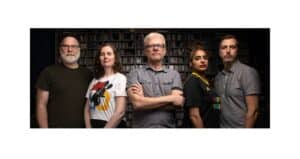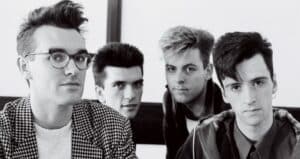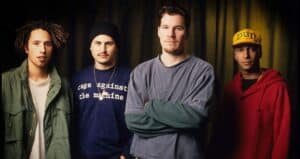The Charlatans: British Indie Resilience with a Psychedelic Soul
The Charlatans, also known as The Charlatans UK in the United States, are a British alternative rock band formed in 1988 in the West Midlands, England. Emerging in the late ’80s during the Madchester and baggy scene, the band quickly became known for their groove-laden, Hammond organ-driven sound, blending psychedelia, garage rock, soul, and Britpop sensibilities.
While many bands of their era fell to fragmentation or fashion, The Charlatans endured—evolving with the times, surviving tragedy, and ultimately becoming one of the most consistent and quietly influential bands in British rock over the last three decades.
The Charlatans. Formation and Line-up
- Formed: 1988, Northwich (Cheshire) / West Midlands
- Original Line-up:
- Tim Burgess – Vocals
- Martin Blunt – Bass
- Rob Collins – Keyboards (until 1996)
- Jon Brookes – Drums (until 2013)
- Mark Collins – Guitar (joined 1991)
The Charlatans formed around bassist Martin Blunt, who recruited like-minded musicians inspired by Northern Soul, The Doors, 1960s psychedelia, and British indie pop. Tim Burgess, whose distinctive nasal voice and magnetic stage presence became a defining trait, joined just before their breakout.
The Charlatans. Musical Style
The Charlatans’ sound blends:
- 60s organ-driven psychedelia – Rob Collins’ Hammond organ work gave them a unique edge
- Funky, groove-heavy rhythms – Drawing from soul, hip hop, and northern dance music
- Britpop and indie rock – Catchy melodies, sing-along choruses, jangly guitars
- Emotional introspection – Especially in later albums, which reflect loss, rebirth, and maturity
They’ve continually reinvented themselves while maintaining an unmistakable sonic fingerprint.
The Charlatans. Key Albums
Some Friendly (1990)
Their debut, released at the height of the Madchester movement, shot to No. 1 in the UK Albums Chart. Full of youthful swagger and groove.
Highlights:
- “The Only One I Know” – Their breakout hit, organ-heavy and infectious
- “Then”
- “Sproston Green”
Between 10th and 11th (1992)
Produced by Flood (U2, Depeche Mode), this album saw them explore darker tones and more expansive production, distancing from Madchester.
Highlights:
- “Weirdo”
- “Tremelo Song”
Up to Our Hips (1994)
A critical success that balanced their early energy with more refined songwriting, showing growing emotional depth.
Highlights:
- “Jesus Hairdo”
- “Can’t Get Out of Bed”
The Charlatans (1995)
Their self-titled fourth album is widely considered one of their best—soulful, confident, and timeless.
Highlights:
- “Just When You’re Thinkin’ Things Over”
- “Crashin’ In”
- “Just Lookin’”
Tellin’ Stories (1997)
Marked by both triumph and tragedy. Keyboardist Rob Collins died in a car accident during recording. The album, finished with help from Martin Duffy (Primal Scream), is one of their most emotionally resonant and successful records.
Highlights:
- “North Country Boy”
- “One to Another”
- “How High”
Us and Us Only (1999)
A more introspective and layered record, showing their post-Britpop maturity. It received critical praise for its thoughtful tone and rootsy atmosphere.
Highlights:
- “Forever”
- “My Beautiful Friend”
Wonderland (2001)
A stylistic shift toward funk, falsetto vocals, and American R&B influences. One of their most daring albums.
Highlights:
- “Love Is the Key”
- “You’re So Pretty – We’re So Pretty”
Modern Nature (2015)
Released after the passing of drummer Jon Brookes, this album is full of grace, optimism, and renewal. Critics called it one of their best.
Highlights:
- “So Oh”
- “Let the Good Times Be Never Ending”
Different Days (2017)
Collaborative and introspective, featuring contributions from Johnny Marr, Stephen Morris, and Sharon Horgan. It reflects modern unease with melodic warmth.
Highlights:
- “Plastic Machinery”
- “Solutions”
Tragedy and Resilience
- Rob Collins, their original keyboardist and a major creative force, died in 1996 in a car accident during the recording of Tellin’ Stories.
- Jon Brookes, their drummer since the beginning, died of a brain tumor in 2013.
Despite these losses, The Charlatans continued with grace, turning grief into resilience and releasing some of their most uplifting and mature music afterward.
Tim Burgess: Frontman and Cultural Connector
Tim Burgess has become a cultural figure in his own right—hosting #Tim’sTwitterListeningParty during lockdown, running O Genesis Records, and releasing solo albums. His influence extends beyond the band, helping to curate and connect musical generations.
Legacy and Influence
- Among the few bands from the Madchester and Britpop eras to remain active and relevant
- Influenced modern indie bands like Kasabian, The Coral, and Courteeners
- Blended soulful groove with British rock tradition in a way few others have managed
- Their back catalogue remains remarkably consistent and diverse, always evolving with subtlety
Where to Start
| Album | Year | Best For |
|---|---|---|
| Some Friendly | 1990 | Energetic Madchester-era debut |
| Tellin’ Stories | 1997 | Their emotional and commercial peak |
| The Charlatans | 1995 | Confident, classic British rock |
| Modern Nature | 2015 | Reflective and graceful return to form |
| Wonderland | 2001 | Funky and adventurous |
Final Thoughts
The Charlatans may not have always been the flashiest name in British music, but they are one of the most resilient, heartfelt, and consistently inventive. Their journey—from psychedelic dance-rock to soulful introspection—reflects the story of British alternative music itself.
For fans of The Stone Roses, Primal Scream, or The Verve, The Charlatans offer a discography filled with groove, grace, and quiet innovation—an enduring voice in the ever-changing landscape of rock.
External Links




